May 26, 2025 | 08:15 GMT +7
May 26, 2025 | 08:15 GMT +7
Hotline: 0913.378.918
May 26, 2025 | 08:15 GMT +7
Hotline: 0913.378.918
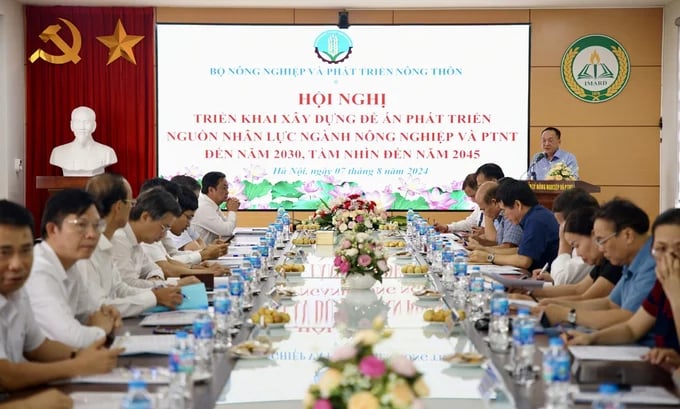
On the morning of August 7, Minister of Agriculture and Rural Development Le Minh Hoan chaired the Conference to develop a project to develop human resources in the Agriculture and Rural Development sector by 2030, with a vision to 2045. Photo: Linh Linh.
Mr. Vu Anh Tai, Vice Principal of the School of Agricultural Personnel Management and Rural Development (Ministry of Agriculture and Rural Development), said that in recent times, training facilities in the field of agriculture and rural development, including establishments under the Ministry, has made many efforts and achieved important results in training and developing human resources.
However, the proportion of workers in the agricultural sector with diplomas and certificates is still low. Vietnamese agricultural workers mainly have low qualifications and skills, with a large proportion of untrained workers.
Among nearly 1 million rural workers who received vocational training, 65% studied non-agricultural occupations to change careers. The rate of workers with diplomas and certificates in the agricultural sector only increased from 2.4% (2010) to 4.1% (2020), while this rate nationwide is 26.1% in 2021. .
Labor productivity in the agricultural sector remains low compared to industry and services, and compared to other countries in the region. Vietnam's agricultural labor productivity is equal to 40% of Thailand, 30% of China and 10% of Malaysia. This leads to difficulties in competing and improving income for workers in the industry, making it more difficult for the agricultural sector to recruit students compared to other sectors.
In the context of high-tech agriculture and ecological agriculture becoming the main trend in the world, Vietnam needs high-quality human resources to convert from traditional production methods to new technology applications, bringing higher added value.
From the above situation, it is necessary to develop a project to develop human resources in the agricultural sector. Accordingly, the project aims to develop human resources to meet quantity and quality requirements by field and region, effectively implementing the goal of building ecological agriculture, modern countryside and civilized farmers.
Form a team of professional, knowledgeable, and highly skilled farmers to become the main force in the process of rural economic development; build a team of leaders, managers, and young entrepreneurs with administrative capacity, integration skills, entrepreneurial spirit and desire to contribute; train a team of experts and scientists capable of researching, accessing and transferring advanced and modern technology and promoting innovation; foster a team of leaders, civil servants, and professional officials with qualifications, capacity, moral qualities, and enthusiasm, responsibility to meet the requirements of industrialization, modernization and international integration.
By 2030, the agricultural sector is expected to account for 20% of the country's workforce. The rate of trained workers in the fields of agriculture, forestry and fisheries reached 70%, of which 10% were workers with degrees and certificates.
In addition, the project also sets the goal of developing human resources for each field of agriculture such as fisheries, cultivation, livestock... and by region.
Contributing opinions from the perspective of institutes and schools to the project of developing human resources in the agricultural sector, Professor. Trinh Minh Thu, Principal of Water Resources University, emphasized the participation of society, businesses, domestic and international employers into practical agricultural training, including discussions and training courses with students so that students can have a realistic view of their future profession.
Besides, Prof. Trinh Minh Thu said that schools need to build practical production models, practical product models made by the schools themselves and students to build society's trust.
Leaders of Water Resources University also shared about multidisciplinary training in the field of agriculture to meet the ever-changing needs of the market and attract human resources through work-oriented programs with foreign businesses and organizations to improve competitiveness and integration ability.
Sharing the same opinion as the school, Dr. Nguyen Cong Tiep, Deputy Director of Vietnam Academy of Agriculture, said that the training program for the new period needs to aim at the output of students who will become agricultural engineers and ensure the provision of comprehensive knowledge so that they are competent to work and meet the needs of society.
Besides, equipping students with soft skills such as communication, behavior and negotiation skills is also very important. Accompanied by expertise that students can apply to jobs in the context of today's science and technology boom.
Mr. Tiep said that the training program needs the active participation of businesses, such as the Vietnam Academy of Agriculture, which has links with more than 200 businesses to improve and provide suggestions for the training program, at the same time, recruiting students. This coordination is not only important in meeting market needs but is also an important element in the training process, creating a close connection between academia and businesses.
At the Conference, Minister Le Minh Hoan raised the issue that the context of a project and strategy needs to be associated with the question of change. Accordingly, human resource training in the agricultural sector changed when lecturers and leaders of institutes and schools admitted that "Changes in training curriculum and training methods in the agricultural sector are needed".
Minister Le Minh Hoan also emphasized the need to change training thinking, stemming from changing and expanding the thinking of the teaching staff.
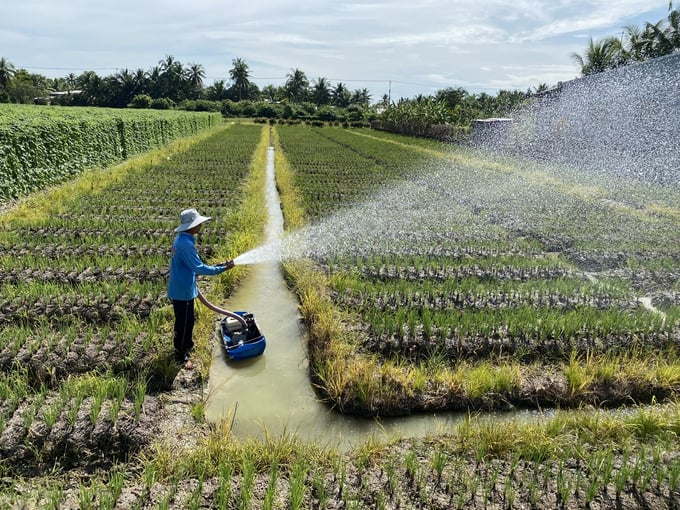
Labor productivity in the agricultural sector remains low compared to industry and services, and compared to other countries in the region. Photo: Le Hoang Vu.
According to the Minister of Agriculture and Rural Development, with the strong rise of science and technology with a series of new factors appearing such as Industry 4.0, artificial intelligence, ChatGPT..., people's thinking in general, agricultural training methods and curriculum cannot be maintained forever as they were 10 or 20 years ago.
“The world is changing, we need to change to a different approach to educate global citizens, have a global mindset, and understand how the world operates.
Since then, the elite group of the agricultural sector is not those with high academic titles or degrees, but those with the highest achievements in technology, who can proficiently apply science and technology to their fields", Minister Le Minh Hoan said.
Take the training method of the academy of C.P Group as an example. In Thailand, helping agricultural students to work in many different environments and fields after graduating. Leaders of the Ministry of Agriculture and Rural Development believe that separating training content further will "suffocate" the output of agricultural students.
"When the agricultural industry is transforming strongly from single value to multi-value integration, why does agricultural human resource training not change in that direction?", Minister Le Minh Hoan asked. At the same time, the commander of the agricultural sector emphasized that in the uncertain future context, agricultural human resources need to be trained with a more open program to be able to participate in all stages, from input to output of agricultural production, meeting the needs of the labor market in the future and in the long term.
Translated by Phuong Linh
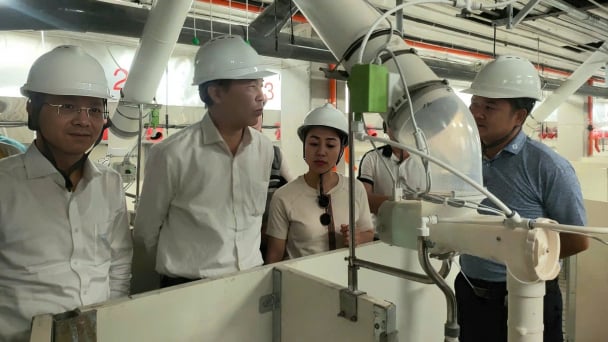
(VAN) Despite investment costs being 1.5 to 1.8 times higher than conventional methods, multi-story pig farming demonstrates outstanding effectiveness, increasing land-use efficiency by 4 to 10 times.
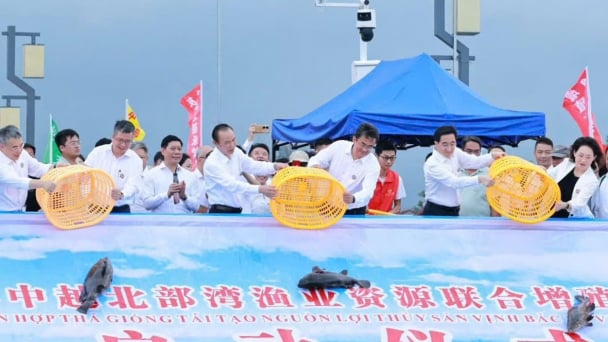
(VAN) Deputy Minister of Agriculture and Environment Phung Duc Tien leads a working delegation to participate in several key activities in China aimed at promoting agricultural and fisheries cooperation.
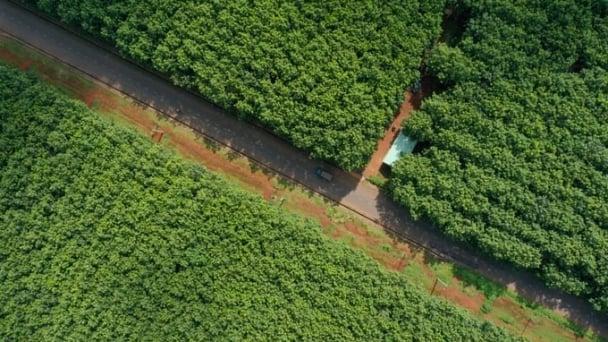
(VAN) The European Commission has just released a list of ‘low-risk’ countries for deforestation, which includes Vietnam.

(VAN) The convenience of single-use plastics is leaving lasting consequences for the oceans.
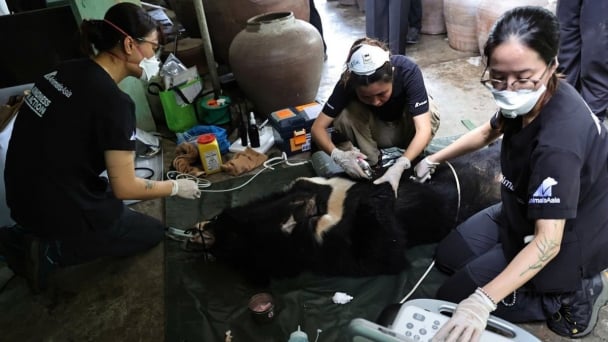
(VAN) On the morning of May 23, in Nghe An, the Animals Asia Foundation successfully rescued a Tibetan bear and transferred it to the Vietnam Bear Rescue Centre located in Bach Ma National Park.
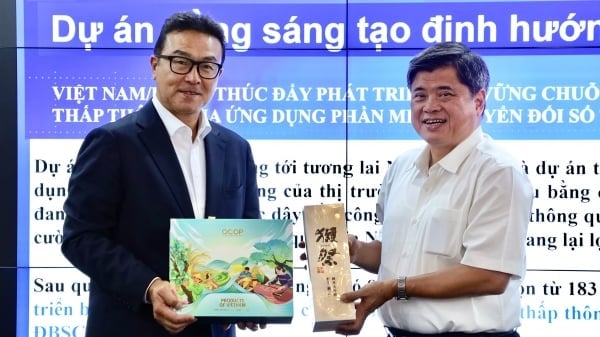
(VAN) On May 23, Deputy Minister of Agriculture and Environment Tran Thanh Nam held a working session with a Japanese delegation on the application of digital technology in agricultural production.

(VAN) In the tranquil wetlands of Van Long, there are quiet souls who guard the forests, nurture the waters, and oversee every bird and troop of langurs as protecting the essence of a living heritage.